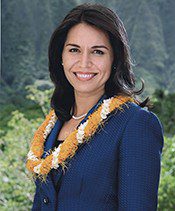A Times Analysis:
In an interview with the Indian private broadcaster NDTV, US Director of National Intelligence (DNI) Tulsi Gabbard made comments regarding the state of religious minorities and Islamist extremism in Bangladesh. Her remarks have stirred controversy, prompting a swift and defensive response from Bangladesh’s interim government.
The Foreign Ministry immediately rejected Gabbard’s claims outright, reinforcing the government’s position. However, many questioned whether this reaction was premature. Does Gabbard’s statement reflect the Biden-Trump transition policy on Bangladesh, or is it merely an extension of India’s geopolitical narratives?
The interim government’s rapid response highlights its sensitivity to international scrutiny, particularly on issues related to religious freedom and Islamist extremism. However, some analysts argue that Dhaka’s knee-jerk reaction may have given undue importance to what was, at best, a leading question-and-answer exchange rather than an official US policy statement.
First, Gabbard’s remarks were made in response to NDTV’s questions, rather than in a formal speech or policy briefing. This raises concerns that Bangladesh’s government may have overreacted to a media-driven controversy rather than a calculated diplomatic move from Washington.
If Gabbard’s comments were shaped by NDTV’s framing, Bangladesh’s rebuttal may have unintentionally amplified the issue rather than neutralizing it.
Second, Gabbard has a well-documented history of aligning with Hindu nationalist narratives. Her statements might have closely mirror India’s long-standing claims about minority persecution in Bangladesh — claims often used to justify domestic policies such as the Citizenship Amendment Act (CAA).
Given her closeness to India’s right-wing political circles, it is plausible that her views on Bangladesh are influenced more by New Delhi’s interests than by a rigorous assessment from the US intelligence community.
A key question arising from this controversy is whether Gabbard’s comments represent the official stance of the Trump administration. So far, there has been no statement from the White House or the State Department endorsing her views. This absence suggests that Gabbard may have been speaking in a personal or ideological capacity rather than conveying an institutional perspective.
Gabbard also noted that engagement between the Bangladeshi interim government and the US began to develop gradually after last year’s mass uprising, which led to the ousting of former Prime Minister Sheikh Hasina. Hasina fled the country in August and has been residing in India since.
It is also worth noting that U.S.-Bangladesh relations have been strained in recent years, particularly after the Biden administration imposed sanctions on the Rapid Action Battalion (RAB) over human rights violations. Hasina was notably critical of the US, and many of her supporters believe that the Biden administration, through its deep state apparatus, backed the last year’s protests in Bangladesh.
Trump’s return to power has led many in Dhaka to hope for a reset in bilateral relations, with expectations that Washington’s engagement would shift away from human rights concerns and focus more on strategic and economic interests. However, if Gabbard’s comments hint at the new administration’s approach, Dhaka may need to brace for renewed scrutiny.
Trump’s foreign policy is expected to be transactional, meaning Bangladesh’s geopolitical value — particularly in countering China’s influence — will be a major factor in future US engagement. If Washington prioritizes Bangladesh as a regional counterweight to China, issues like minority rights and Islamist extremism may become secondary concerns.
While this controversy is unlikely to trigger a major shift in US-Bangladesh relations, a few key factors will determine whether Gabbard’s remarks gain further traction:
If her statement is echoed by the State Department, Congress, or other US officials, it could indicate a broader policy shift. However, if her remarks remain isolated, they will likely fade into irrelevance.
If India continues pushing the narrative of minority persecution in Bangladesh, it could influence US policymakers who rely on New Delhi for intelligence and policy direction on South Asia.
Notably, during a joint press conference with Indian Prime Minister Narendra Modi in Washington, President Donald Trump was asked about US involvement in Bangladesh’s recent regime change. Trump dismissed any notion of deep state interference, stating:
“Well, there was no role for our deep state. This is something that the prime minister has been working on for a long time and has worked on for hundreds of years, frankly. I have been reading about it. But I will leave Bangladesh to the prime minister.”
Modi, however, did not address the Bangladesh issue.
At this point, Bangladesh’s diplomatic handling of the situation will be crucial. If the interim government maintains a composed, fact-based approach — rather than an emotionally charged response — it can prevent the controversy from escalating.
A well-articulated narrative that highlights Bangladesh’s progress in religious harmony and counter-extremism efforts could help neutralize any long-term impact of Gabbard’s comments.
For now, her remarks appear to be a diplomatic flare-up rather than an indication of a policy shift.
However, Bangladesh must remain vigilant. If her views gain traction within the Trump administration, they could lead to a more critical US stance on Bangladesh.
Conversely, if Dhaka navigates this challenge strategically —balancing engagement with Washington while avoiding overreactions — it can prevent the controversy from becoming a major bilateral issue.
Ultimately, Bangladesh’s best course of action is not to simply dismiss the remarks but to proactively engage with Washington, ensuring that its perspective is heard at the highest levels of the US government.
How Dhaka manages this moment may shape US-Bangladesh relations in the years to come.


